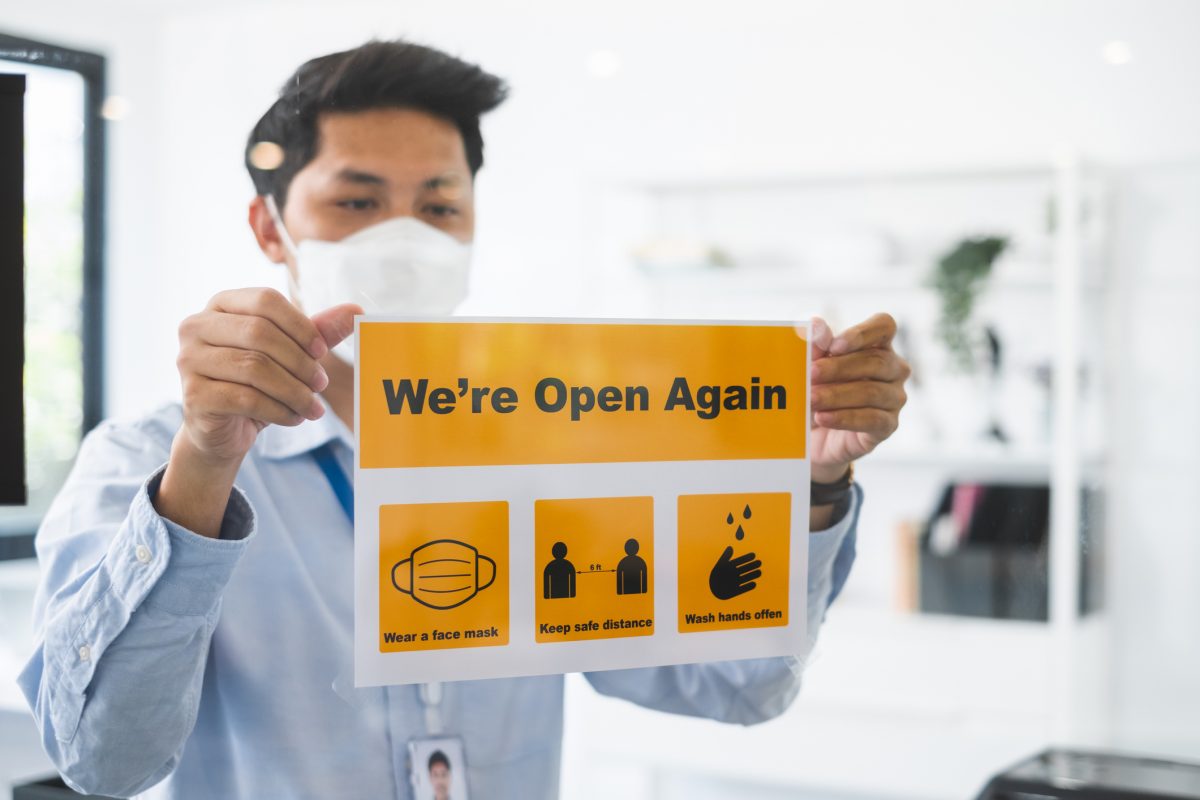Many GMS clients are looking at their talent management programs to address issues relating to how COVID-19 impacts employees’ mental health. Anxiety and stress resulting from the global pandemic may have a significant impact on an organization’s ability to attain its objectives. Talent management encompasses many important aspects as to how a company functions, including:
- Identifying the organization’s specific needs for talent
- Finding candidates with the right qualifications
- Providing opportunities for employees to develop skills on the job
- Offering training and education to increase the employees’ expertise
- Keeping employees engaged and motivated to reach company objectives
Each country, state, and city may have its own specific requirements as to how residents should comply to ensure safety during the COVID-19 pandemic. Transportation could be impacted, as well as schools and other public services. All of these requirements can add significantly to how an employee feels about their safety and security. These requirements might also impact whether employees can get to their place of work, or increase requests for alternative work arrangements to deal with child care needs. Companies should look into a variety of mental health resources that can help employees who could be experiencing issues relating to COVID-19.
Agile Talent Management Programs Might Have Some Mental Health Resources
Agile talent management programs can help companies respond rapidly to new challenges. Many companies already have online learning resources that employees can easily access. Also, Employee Assistance Programs (EAPs) often provide a wide variety of helpful resources for employees dealing with issues that may directly impact their mental health.
COVID-19 Mental Health Resources May Not Be Readily Available
However, dealing with the impact of COVID-19 is not likely to be one of the topics in any company’s library of readily available learning resources. The most recent global pandemic that bears some similarity to the current COVID-19 situation is the 1918 influenza pandemic, occurring over 100 years ago.
Also, isolation resulting from COVID-19 restrictions may lead to increased alcohol and other substance consumption. Those at risk of substance abuse may not have the ability to easily find healthy coping skills. As reported by Nielsen, alcoholic beverage sales rose by 55% during the third week of March. Unhealthy alcohol consumption can lead to a wide number of additional medical and mental health issues.
Resources for COVID-19 Mental Health
Anxiety and stress are major factors that can negatively impact employees’ mental health. As such, companies should provide access to helpful resources that specifically target COVID-19 issues.
GMS spoke with Dr. Eric Goodman, a clinical psychologist who specializes in treating fears/phobias, persistent worrying, panic attacks, Obsessive-Compulsive Disorder (OCD), and social anxiety. Dr. Goodman’s Coastal Center for Anxiety Treatment practice is located in San Luis Obispo, California. He is author of the upcoming book “Your Anxiety Beast and You: A Compassionate Guide for Living in an Increasingly Anxious World,” to be published in May 2020 from Exisle Publishing.
Dr. Goodman has published several articles to help people understand the source of anxiety around the COVID-19 pandemic, as well as how best to manage this anxiety.
What are the Sources of Anxiety around COVID-19?
According to Dr. Goodman, our anxiety has evolved over time to help us survive in worlds that were harsh and unforgiving, with straightforward dangers. Our ancestors knew to run from harm, and their anxiety helped them overcome prehistoric challenges.
In a sense, our anxiety around COVID-19 also consists of known threats to our safety: the coronavirus that may sicken us and our loved ones. Additionally, the forced isolation prevents us from having compassionate connections with others. We feel alone, under threat, and constantly bombarded by a daily news cycle filled with difficulties and sadness. Our mental health takes a beating.
Even if we take reasonable safety measures and abide by all of the precautions, we still face much uncertainty, and with this uncertainty is a risk of danger. Our anxiety wants the COVID-19 risk to be completely gone. Although the statistics favor our survival, we still feel anxiety, and over time may feel that our anxiety itself is a threat to us. All of this results in a higher degree of suffering. Employees may become so overwhelmed by their anxiety that they may not be able to focus on their jobs and corporate objectives.
How Should we Manage the Anxiety Around COVID-19?
There are several ways we can manage the anxiety around COVID-19. Dr. Goodman suggests three specific things we can do to mitigate this anxiety and help improve our mental health:
- Become mindful of our how bodies react to anxiety so we can let go of this struggle
Dr. Goodman suggests exercises such as doing a mindful body scan can be helpful to understand how our bodies react to anxiety.
- Soothe our nervous system to create a peaceful home for our anxiety
By getting enough sleep, avoiding substances that increase anxiety, and other healthy practices, Dr. Goodman believes our nervous system will become a peaceful place. This in turn will help calm our anxiety.
- Teach our anxiety so that it learns something that is safe to do, not just avoid danger
Often our anxiety can pursue actions that border on superstition or phobia. Rather than follow guidelines such as washing our hands for 20 seconds correctly, our anxiety extends the time or the frequency of handwashing. According to Dr. Goodman, we can teach our anxiety what is reasonably safe.
Additional Resources for COVID-19 Mental Health
MHA is the nation’s leading community-based non-profit organization that focuses solely on those living with mental illness. MHA has compiled a number of resources that directly address issues relating to COVID-19.
ADAA has a number of resources including blog posts and videos with helpful tips for dealing with anxiety around COVID-19.
The CDC has created a resource page dedicated specifically to stress and coping with COVID-19. The CDC further instructs those dealing with preexisting mental health conditions to continue their treatment. Also, the CDC notes they can find additional information at the Substance Abuse and Mental Health Services Administration (SAMHSA) “Disaster Preparedness” page.
SAMHSA provides guidance and resources to assist individuals, providers, communities, and states across the nation in dealing with the effects of COVID-19, including emergency grants and disaster planning.
Rehab 4 Addiction, based in the UK, provides speedy admissions into residential rehabs across the United Kingdom and internationally. The team has recently published Coronavirus: Guidance for Better Mental Health, an educational guide to help increase understanding and awareness of all aspects of coping with the stress of the lockdown and bereavement. Their hope is that this resource can be one of many stepping stones for those struggling and their loved ones to better understand their situation and lead them to find a supportive and safe environment.
Ark Behavioral Health is accredited by the Joint Commission, the “Gold Standard” for behavioral health facilities. The goal at Ark is to use a whole-patient approach built on a foundation of integrity, transparency, and compassion. Each facility is centered around individualized patient care with an emphasis on long-term recovery to empower those with sense of purpose and joy. They strive to have their website be an educational resource by providing up-to-date, accurate, and evidence-based information related to substance abuse, mental health, and more. This is done in order to increase understanding and awareness of addiction without shame.
The Recovery Village seeks to assist those in recovery and decrease the spread of COVID-19, and has launched a Teletherapy Program. Those in need now have access to one-on-one counseling, group therapy, and various online services virtually with a licensed professional, improving their chances of a successful recovery. TRV has also published many support resources to assist those in recovery during the pandemic.
The Palm Beach Institute is an an organization dedicated to assisting individuals in overcoming addiction. The COVID-19 pandemic presents unique challenges for people with substance use disorders and in recovery. They have published a guide to understanding addiction relapse during COVID-19 and tips for remaining sober.
Southern California Sunrise Recovery Center provides resources for common issues people are dealing with, tips for reducing stress and anxiety, and how to get help for managing mental health during COVID-19.
Recovery Champions is accredited by the Joint Commission, the “Gold Standard” for behavioral health facilities. The goal at RC is to help individuals get personalized addiction treatment through evidence-based practices, trauma counseling, and treatment for co-occurring mental health disorders. They believe that Individualized treatment leads to long-term recovery.
Choosing Theraphy provides an online mental health resource, and has published a comprehensive guide to EAP explaining what it is, how and when to use it for mental health, types of mental health care provided, and more.
What Should Employers do?
Employers should share helpful mental health resources that can help employees who may be experiencing issues relating to COVID-19. As a result, employees will be able to reduce the impact of anxiety and stress. They will also be able to focus on their jobs and corporate objectives. Employers should examine their talent management and employee assistance programs to determine if resources are in place that address COVID-19 mental health issues.
Conclusion
Global Mobility Solutions’ team of corporate relocation experts has helped thousands of our clients understand how to develop talent management programs to address employee needs. Our team can help your company understand how to find and utilize valuable mental health resources that can help employees who may be experiencing issues relating to COVID-19.
GMS was the first relocation company to register as a “.com.” The company also created the first online interactive tools and calculators, and revolutionized the entire relocation industry. GMS continues to set the industry pace as the pioneer in innovation and technology solutions with its proprietary MyRelocation® technology platform.
Learn best practices from Global Mobility Solutions, the relocation industry and technology experts who are dedicated to keeping you informed and connected. Contact our experts online to discuss your company’s need for information about mental health resources for employees dealing with anxiety and stress due to the COVID-19 pandemic, or give us a call at 800.617.1904 or 480.922.0700 today.





 It’s been getting
It’s been getting 
 “I moved recently, so I have been unpacking, remodeling, and painting my new home. I have also been making
“I moved recently, so I have been unpacking, remodeling, and painting my new home. I have also been making 




